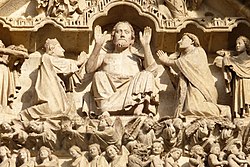
Back الدين في فرنسا Arabic Fransada din Azerbaijani Náboženství ve Francii Czech Religión en Francia Spanish Erlijioa Frantzian Basque Religion en France French Religija u Francuskoj Croatian Religioni in Francia Italian Религија во Франција Macedonian Religie in Frankrijk Dutch
Religion in France (2021)[1]


The majority of the religious population in France identifies as Christian. Catholicism is the most prominent denomination in France, but has long lost the state religion status it held prior to the 1789 French Revolution and during various non-republican regimes of the 19th century, including the Restoration, the July Monarchy and the Second French Empire.
Religion in France is diverse, which could be attributed to the country's adherence to secularism, freedom of religion and freedom of thought, as guaranteed by the 1789 Declaration of the Rights of Man and of the Citizen. The Republic is based on the principle of laïcité (or "freedom of conscience") established by the 1880s Jules Ferry laws and the 1905 French law on the Separation of the Churches and the State.
The major religions practiced in France include Christianity (about 50% of the overall population,[1] with denominations including Catholicism, various branches of Protestantism, Eastern Orthodoxy, Armenian Orthodoxy), Islam, Judaism, Buddhism, Hinduism, and Sikhism among others, making it a multiconfessional country. About 40% of the population is non-religious. Sunday Mass attendance has fallen to 5% for Catholics, and the overall level of religious observance is generally lower than in the past.[2][3]
- ^ a b "Etat des lieux de la laïcité en France - 2021" (PDF) (official statistics) (in French). Observatoire de la laïcité, Government of France. p. 37.
- ^ Knox, Noelle (11 August 2005). "Religion takes a back seat in Western Europe". USA Today.
- ^ "France – church attendance". Via Integra. 10 June 2010. Retrieved 23 February 2012.
© MMXXIII Rich X Search. We shall prevail. All rights reserved. Rich X Search